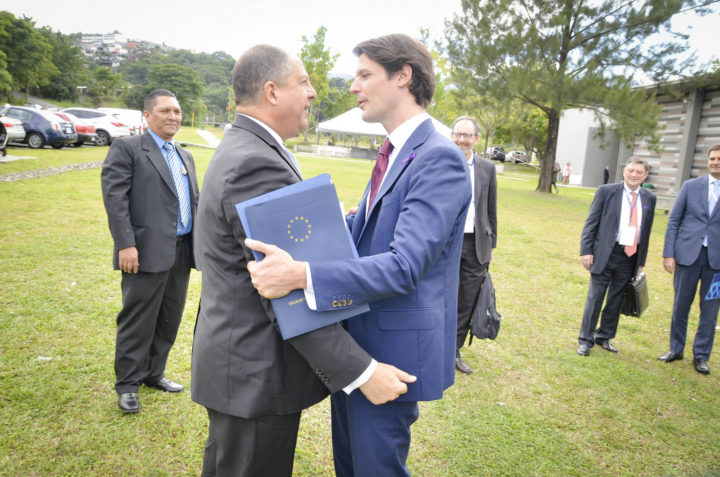The President of Costa Rica, Luis Guillermo Solís, and the Ambassador for the European Union, Pelayo Castro, inaugurated the event that will bring together 250 representatives of 19 countries from Latin America and Institutions and Members of the EU

San José will be the Euro-Latin American capital of social cohesion during the next three days. The President of the Republic, Luis Guillermo Solís, inaugurated the international meeting of the European Union EUROsociAL + program which, for the last decade, has been promoting public policies that fight inequality in Latin America. The President highlighted in his speech the start of the third phase of this consolidated program: “We are already working on a new phase of EUROsociAL, that is why very important actions, such as the creation of a permanent regional plan against gender violence and updating of the national gender equality and equity policy are underway; as well as jointly undertaking compliance with tax commitments regarding the Process of Adhesion of Costa Rica to the Economic and Social Council and promotion of a culture of transparency and proactive work with Local Governments for the promotion of citizen participation. In that line, tomorrow we will sign a letter of commitment for the creation of the Economic and Social Council in Costa Rica.”
Together with the Costa Rican president, this Latin American – European Union summit for social cohesion opened with the words of the Ambassador to the European Union in Costa Rica, Pelayo Castro, who stated: “EUROsociAL+, with more than 32 million Euros, places a social agenda in the center of the debate and cooperation between the European Union and Latin America, supporting strategic public policy that battle inequality and strengthen social cohesion.”
EUROsociAL+ in Latin America
Although inequality decreased in Latin America and the Caribbean between 1980 and 2014, it is still remains the most unequal region in the plant. Meanwhile, inequality in Europe has increased after the crisis, from which it is trying to slowly recover. This context puts sustainable development to the test for both regions, particularly regarding reduction of poverty and inequality, and the expansion of the middle class in Latin America and the Caribbean; and maintenance of the welfare state in Europe. For this reason, the Euro-Latin American meeting of EUROsociAL+ in San José marks a turning point in the path that both regions must take in the fight against inequality through public policies, in synergy with the challenges contained in the 2030 Agendaand the Sustainable Development Goals; putting social cohesion back into the regional policy dialogue between Europe and Latin America.
EUROsociAL+ is a program between the European Union and Latin America that promotes these types of public policies that improve social cohesion for Latin American society, namely, the reduction of material, welfare and citizenship gaps and, above all, the challenge of reaching equality between men and women. Led by the public Spanish institution FIIAPP (International and Ibero-American Foundation for Administration and Public Policies), its director Pedro Flores represented a consortium during the inaugural act, comprising Expertise France, the Italo-Latin American Institute (IILA) and the Central American Social Integration Secretariat (SISCA).
Advances in Costa Rica
In Costa Rica, these investment in public policy aimed at the citizens, has achieved impressive results in government programs that have been supported by EUROsociAL. An example of this is “Puente al Desarrollo”, the national strategy aimed at reduction of poverty, which has contributed with a reduction in rural poverty and extreme poverty, consecutively, for the last four years, which translates into 8,341 homes that are no longer classified in extreme poverty and 2,039 homes overcoming their poverty situation.
Young people and women are a priority group for EUROsociAL. In Costa Rica, support has been provided for a program called “Empléate” (Get Hired), which is aimed at young people with ages between 17 and 24, who do not study or work and are also facing unfavorable social and economic conditions. They received help to improve their education and job placement by providing them with an opportunity to study careers in the high technology sectors, connecting them with the job market and/or facilitating insertion in case of any type of disability.
Also, firm work is done in the fight against all types of violence against women, in the expansion of a childcare and development network, in the improvement of transparency in public institutions and the promotion of equal development for all regions in Costa Rica. All these policies can be extrapolated to a regional level in 17 Latin American countries which, together with Costa Rica, are the protagonists at EUROsociAL and the summit which started today.
EUROsociAL+ / Presidencia de Costa Rica / UE en Costa Rica




